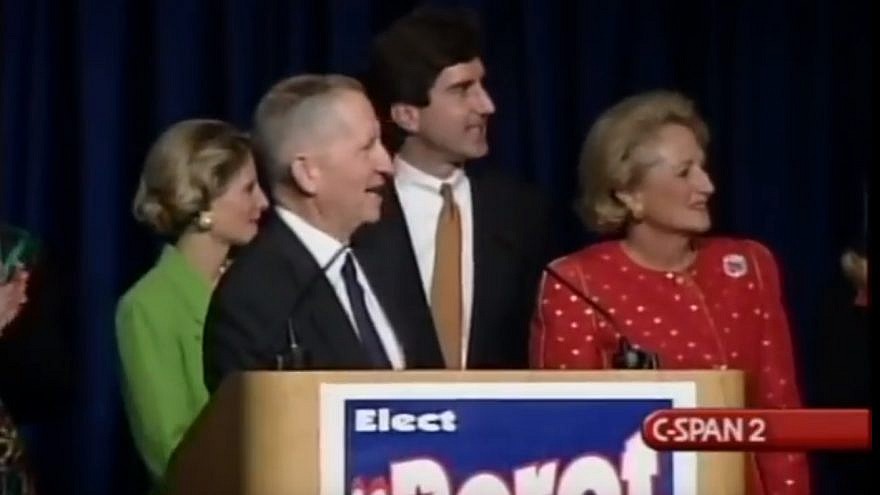Two-time U.S. presidential candidate Ross Perot died in Dallas on Tuesday at the age of 89 after a battle with leukemia.
Beside for becoming a self-made Texas billionaire, he was known for calling for balancing the budget, opposing the outsourcing of U.S. jobs and advocating for reducing the national debt, in addition to supporting abortion rights and gun control.
“Support for Israel was not a big issue in 1992, when Ross Perot had his big moment. [It] was just a given, as it should be,” historian Gil Troy told JNS.
Regardless, the Zionist Organization of America mourned his passing. “Perot expressed strong support for Israel,” ZOA national president Mort Klein told JNS.
Klein noted that during the 1991 Gulf War, which the Electronic Data Systems (EDS) founder opposed, “Perot insisted that ‘Israel has been our friend during the recent war, and you stand by your friends. It’s just that simple.’ ” They were remarks that Perot, who sold EDS to General Motors for $2.5 billion several years prior, made at an American Jewish Committee dinner in New York, his first comments to a Jewish crowd after declaring his candidacy.
Perot added, “Israel is a beacon in its part of the world in terms of its democratic government. It is a role model to the others there,” urging the United States to strengthen Israel economically.
“Israel is a beacon in its part of the world in terms of its democratic government. It is a role model to the others there.”
“History may have turned out better if Ross Perot had won the 1992 presidential election,” said Klein. “We might have avoided having Bill Clinton pressure Israel to agree to the disastrous 1993-94 Oslo Accords, which brought the [Palestine Liberation Organization] and PLO arch-terrorist Yasser Arafat into Judea and Samaria, and resulted in Palestinian-Arabs murdering and maiming 10,000 innocent Jews throughout the next years and decades.”
On June 15, 1992, New York Times columnist Leslie Gelb wrote about the then-U.S. President George H.W. Bush losing credibility in the Jewish state:
“Israel may be the only country in the world where leaders of all parties would like to see George Bush retired. Neither Prime Minister Yitzhak Shamir nor the Labor Party leader, Yitzhak Rabin, nor other politicians I talked to this week will say that outright. But their feelings are unmistakable: They think that at best Mr. Bush does not place high value on Israel, and that at worst he would nail the old tail to the wall if re-elected.
“Ross Perot scares them too because they have no idea what or how he thinks, particularly about the Middle East. Word is just beginning to filter back here about Mr. Perot’s staff rebuffing contacts by American Jewish leaders. Israelis know little about Marilyn Berger, the former reporter who is now the Perot Mideast adviser. But they are uneasy about Don Hewitt, her husband, whose CBS news program, ‘60 Minutes,’ has done some hard-hitting features on Israel.
“Bill Clinton, with good ties to the Jewish community and with his positive rhetoric about Israel, is the beneficiary of all these considerations. But mainly, Israeli pols have been quite careful in talking about America.”
‘He admires the Jewish people’
Perot was also a financial donor to Jerusalem’s Shaarei Zedek Medical Center and was fond of then-Israeli Housing Minister Ariel Sharon.
“I know that he admires Sharon,” Morris Talansky, executive vice chairman of the American Committee for Shaare Zedek, told Jewish Telegraphic Agency (JTA) in 1992, mentioning that Perot had visited Israel.
“He admires the Jewish people, and he certainly admires Israel and is a very warm friend of the hospital,” said Talansky.
Perot was close friends with Morton Myerson, who worked with him at EDS and later at the information-technology services firm Perot Systems.
During the 1992 campaign, however, it was publicized that two Orthodox Jews—Reggie Dallaire and Nancee Haft—were fired from EDS during the early 1980s and 1985, respectively, with the former being relieved for wearing a beard and the latter for being absent from work during the Jewish holiday of Sukkot.
Perot and Meyerson said they didn’t know about the Dallaire case, and Meyerson told JTA that he himself did not know about Haft’s case, which happened the year after EDS was sold to GM.
“We had a policy of not discriminating against anyone based on religion, race, color or sexual orientation,” Meyerson told the outlet. “Since I am Jewish, I vigorously enforced that policy.”
In a 1992 interview with ABC News, Perot said, “In terms of your inference of discrimination, please don’t lose sight of the fact that the great builder of EDS happened to be a Jew, Mort Meyerson.”
Perot gave the biggest single donation to a new cultural hall in Dallas, contingent upon it being named for Myerson. The Meyerson Symphony Center opened in September 1989.
Two years earlier, Perot was honored with the Raoul Wallenberg Award “for his personal courage in the dramatic rescue of his [two] American employees being held captive in Iran” during the Iranian hostage crisis from November 1979 to January 1981, according to the website of the Raoul Wallenberg Award Committee of the United States. The award is known for the Swedish diplomat who saved thousands of Hungarian Jews during the Holocaust.
“The things he did were just incredible,” said Perot of Wallenberg upon accepting the award. “He had to go up against [Adolf] Eichmann … he had nothing but gall, bluff, brains, wits, creative ability.”
In 1996, Perot ran under the Reform Party banner, winning 8 percent of the popular vote—more than 10 points lower than four years before. Clinton won re-election.
Perot is survived by his wife, Margot; their five children; a sister; and 19 grandchildren.

























